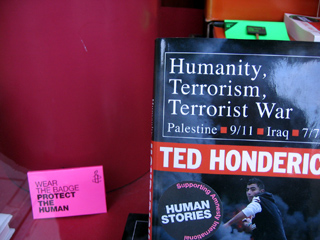I was glad to read today that the safe injection site for heroin in Vancouver has received approval from the federal minister of health, Tony Clement, to remain open until December 2007. Safe injection sites represent what I see as the most intelligent approach to dealing with addictive drugs, namely that of harm reduction. Given the enormous amount of harm that arises from activities peripheral to drug use, this is an approach with real promise.
By providing clean facilities and sterile needles, such sites reduce the probabilities of the transmission of infectious disease through intravenous drug use. Given the ever-rising numbers of people with AIDS and Hepatitis C, this is an incontrovertible benefit. Dr. Julio Montaner, director of the B.C. Centre for Excellence in HIV/AIDS has said, of this facility:
The supervised injection site has saved lives, has optimized the use of medical services by entrenched addicts who are sick because of their addiction, has decreased risky behaviors that promote HIV spread, hepatitis C and others, has diminished the inappropriate use of medical resources, has not had a negative impact attracting news users, promoting drug use.
More generally, safe injection sites provide a window for public health authorities into lives that would generally be concealed from them: a glimpse that can only be afforded on the basis that those being helped can be sure they will not be turned over to the police.
Those sites that actually provide addicts with heroin generate additional benefits. Firstly, doing so eliminates the need on the part of addicts to generate funds to sustain a drug habit. Since those funds are likely to be generated in illegal ways, this reduces the amount of crime associated with drug use. Secondly, since distributional channels are often controlled by organized crime, giving addicts means of circumventing them reduces the income and influence of these groups. Given the enormous corrupting power organized crime groups have on governments and police forces, this is most welcome. Such groups are also notoriously violent, and prone to engaging in bloody competition with one another, as well as perpetuating other criminal activities related to the practice or profits of the distribution of illegal drugs. The fact that the Vancouver Police Department has repeatedly expressed support for the safe injection site demonstrates that the arguments about crime reduction have merit. On Clement’s politically risky decision, they supported him “for making a very difficult decision on a complex issue, and for the care with which it has approached it.”
In the end, criminalizing drug use is a strategy where the intuitive appeal falters on the shoals of practical considerations. Countries that have vigorously pursued the enforcement of drug laws – especially the United States – have increased their prison populations while doing little to deal with the underlying issues. Given the reduced life prospects for anyone who has been convicted, as well as the toxic and criminally encouraging environment inside many prisons, such policies generate further harmful knock-on effects.
I am glad that drug policy is an area where Canada has generally been able to steer its own course, subject to the occasional frantic denouncement from across the border. It shows that Canadian values like compassion and pragmatism can be applied successfully even in policy areas that are frequently the source of vitriol and extreme polarization.



